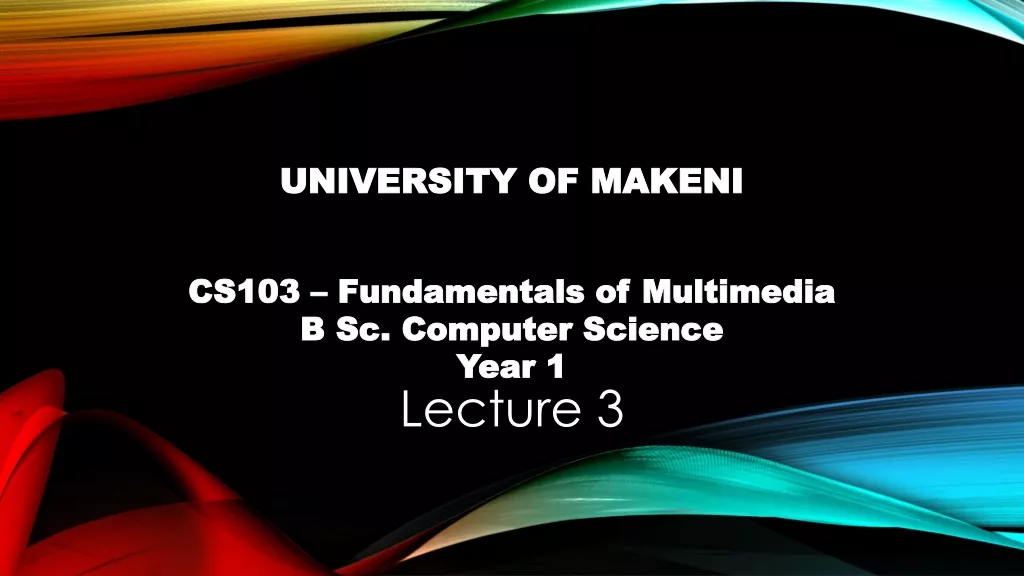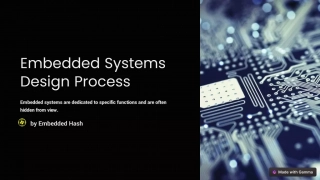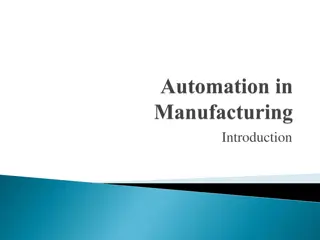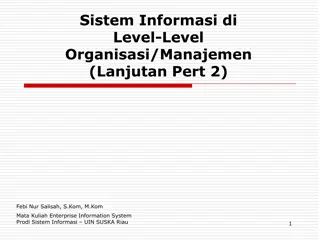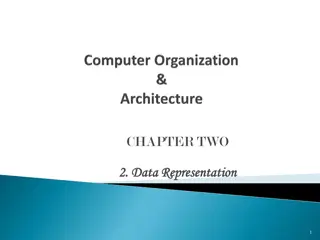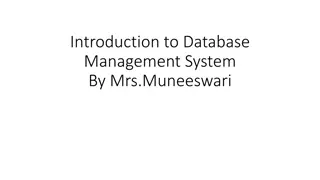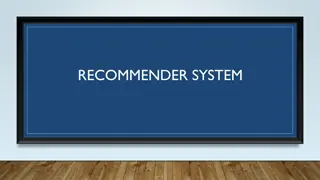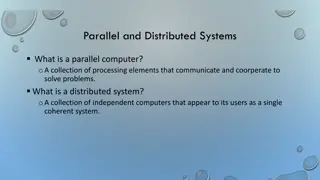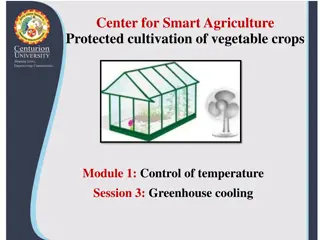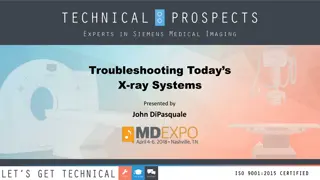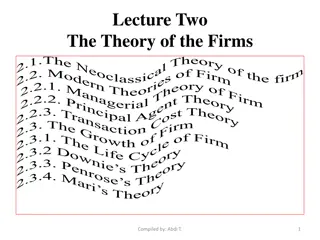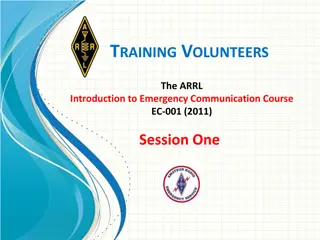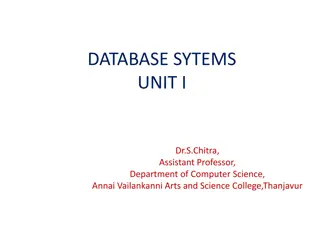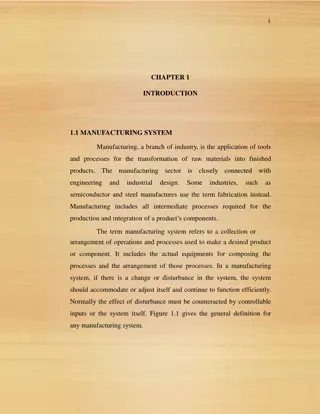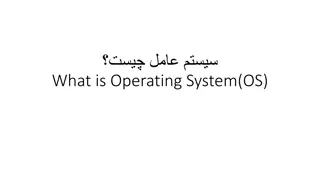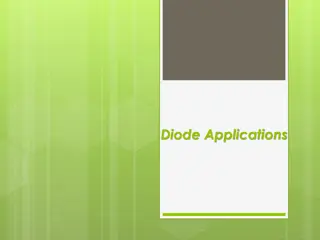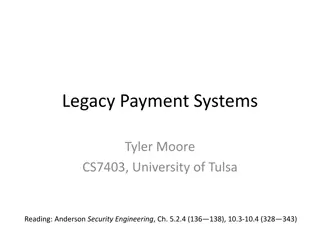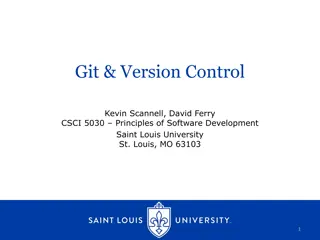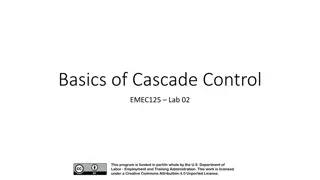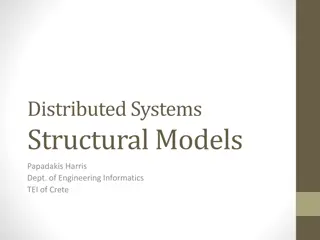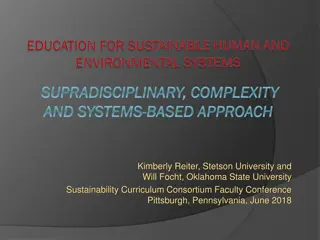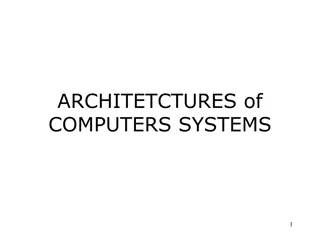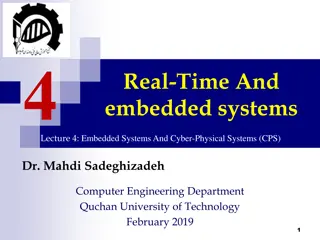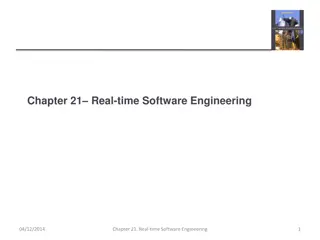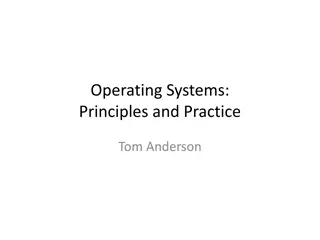Multimedia Systems: Hardware and Software Components
Multimedia systems require specific hardware and software components to meet the demands of producing and playing multimedia content. Development systems are used for creating content with higher specifications, while playback systems are used for playing multimedia files with lower specifications.
9 views • 46 slides
Embedded Systems Design Process in the Embedded systems
Embedded systems are all around us, from the tiny microcontrollers in our household appliances to the sophisticated control systems in cars and aeroplanes. But how are these systems designed? Let's delve into the basics of the embedded systems design process in simple terms that anyone can understan
2 views • 9 slides
Evolution of Manufacturing Systems: From Handicraft to Automation
The evolution of manufacturing systems traces back to manual craftsmanship and has progressed into automated processes using machines and computerization. Specialization of tasks, organization of production systems, and different categories of manufacturing methods have played crucial roles in shapi
7 views • 19 slides
Overview of Distributed Systems: Characteristics, Classification, Computation, Communication, and Fault Models
Characterizing Distributed Systems: Multiple autonomous computers with CPUs, memory, storage, and I/O paths, interconnected geographically, shared state, global invariants. Classifying Distributed Systems: Based on synchrony, communication medium, fault models like crash and Byzantine failures. Comp
10 views • 126 slides
Operating Systems
An operating system is a crucial program that manages all other programs on a computer. It handles tasks like input recognition, file management, and device control. There are different types of operating systems such as single-user, single-task systems, multi-user, multi-task systems, real-time ope
6 views • 11 slides
Information Systems in Organizational Management
Management in organizations is divided into three levels: operational, tactical, and strategic. Each level requires different information systems to support various activities. Operational systems focus on routine transactions and control processes, while middle-level systems aid in semi-structured
10 views • 39 slides
Evolution of Modern Poetry in the 20th Century
Modern poetry in English emerged in the early 20th century as a reaction to Victorian formalism. Modernists drew inspiration from diverse literary traditions, including Greek, Chinese, and Japanese poetry, to create works that depicted social changes and the impact of World War I. Themes of material
1 views • 7 slides
Evolution of Modern Drama in the 20th Century: Characteristics and Trends
Modern drama in the 20th century experienced a revival and various trends. Realism was a significant quality where dramatists like Ibsen focused on portraying real problems of life. Problem plays emerged, addressing societal issues like marriage and justice. Modern drama shifted towards being a stag
2 views • 14 slides
Evolution of Jazz Dance: From Origins to Modern Trends
Explore the fascinating history of jazz dance, from its African-American roots and early dancers like Jack Cole and Katherine Dunham to how it has evolved over the years. Discover the influence of ballet, tap, and modern dance on jazz, along with changes in footwear, clothing, and choreography. See
2 views • 8 slides
Guide to Tackling Modern Slavery in Leeds
The Leeds Pledge to Tackle Modern Slavery offers a comprehensive guide for individuals and organizations in Leeds to combat modern slavery effectively. Launched on Anti-Slavery Day, this guide covers key sections like Recognize, Report, Support, Prevent, and Raise Awareness, providing information, r
0 views • 33 slides
Number Systems in Computer Science
Exploring how modern computer systems represent numeric values using various numbering systems such as binary, decimal, and hexadecimal. Discover the fundamentals of each system, their importance in digital systems, and methods for representing negative integers.
0 views • 17 slides
Introduction to Database Management System Explained
This presentation covers the basics of database management systems, including definitions of data, types of data, structured and unstructured data, storing data in computers using file systems and database systems, and issues with file systems like data redundancy, inconsistency, difficult data acce
3 views • 18 slides
Different Types of Recommender Systems
Recommender systems play a crucial role in providing personalized recommendations to users. This article delves into various types of recommender systems including Collaborative Filtering, Content-Based, Knowledge-Based, and Group Recommender Systems. Collaborative Filtering involves making predicti
1 views • 7 slides
Parallel and Distributed Computing Systems
In parallel computing, processing elements collaborate to solve problems, while distributed systems appear as a single coherent system to users, made up of independent computers. Contemporary computing systems like mobile devices, IoT devices, and high-end gaming computers incorporate parallel and d
2 views • 11 slides
Efficient Greenhouse Cooling Systems for Smart Agriculture
Active summer cooling systems like fan-and-pad and fog systems are crucial for maintaining optimal temperatures in greenhouses. These systems work by utilizing evaporation to remove heat from the air. Fan-and-pad cooling systems have been in use since 1954, where water is passed through pads to cool
1 views • 23 slides
Troubleshooting Today's X-ray Systems by John DiPasquale
Gain insights into troubleshooting modern X-ray systems with a comprehensive guide presented by John DiPasquale. Explore X-ray system subsystems, including generator systems and imaging systems, with detailed explanations and visuals. Learn about the basics of generator systems, required circuits, a
2 views • 33 slides
Theory of Firms: Neoclassical vs. Modern Approaches
The theory of firms is explored through the Neoclassical and Modern perspectives. Neoclassical theory focuses on profit maximization, while Modern theory delves into managerial, principal-agent, and transaction cost theories. The discussion covers criticisms of Neoclassical theory and the essential
1 views • 79 slides
Emergency Communication Systems for Volunteer Training
This content covers various topics related to emergency communication systems for volunteer training, including agency communication systems, government radio systems for police and fire departments, emergency medical radio systems, American Red Cross frequencies, and types of served-agency radio sy
2 views • 29 slides
Introduction to Embedded Systems Design
Embedded Systems Design, Chapter 1 provides an insightful overview of embedded systems, distinguishing them from general-purpose computers. The chapter delves into the characteristics of embedded systems, their design considerations, and the various types of embedded computers such as general-purpos
2 views • 7 slides
Database Systems in IT
Database systems play a crucial role in managing and organizing data efficiently. They provide a structured environment for storing and accessing information, enabling various applications in sectors like banking, airlines, universities, sales, and more. The transition from traditional file systems
3 views • 38 slides
Elections and Electoral Systems
Elections and Electoral Systems play a crucial role in modern representative governments, influencing governance, policy-making, and the relationship between the electorate and political elites. The concept of representation, theories of voting, and different electoral systems such as Plurality Majo
2 views • 18 slides
Approaches to Study Comparative Politics: Traditional vs. Modern Perspectives
This chapter discusses the importance of approaches in the study of comparative politics, categorizing them into traditional and modern perspectives. Traditional approaches include philosophical, historical, and traditional institutional approaches, highlighting their strengths and limitations. Mode
2 views • 7 slides
Overview of Manufacturing Systems: Types and Characteristics
Manufacturing systems are essential for transforming raw materials into finished products. This overview covers the types of manufacturing systems, such as job shops and flow shops, along with their characteristics, advantages, and disadvantages. It also introduces modern manufacturing systems like
1 views • 23 slides
Evolution of Operating Systems: A Historical Overview
Operating systems have evolved significantly over the years, starting from single-program machines to modern multi-programming systems. The journey includes the development of batch systems, introduction of multiprogramming, and advancements in memory management techniques. Key milestones such as th
0 views • 35 slides
Diode Applications in Modern Electronic Systems
Diodes are essential semiconductor components with various applications in electronic systems. They allow current flow in one direction, serving as one-way switches. Diodes are used in communication systems, computers, power supplies, televisions, radar circuits, and more. One significant applicatio
1 views • 19 slides
Evolution of Secure Interbank Payment Systems
The evolution of interbank payment systems from legacy test key systems to the modern SWIFT network is explored, highlighting the challenges of securing telegraph-based transactions in the 19th century and the transition to SWIFT in the 1970s for more reliable and secure financial communication. The
0 views • 25 slides
Version Control Systems in Software Development
Version control systems like Git play a crucial role in modern software development by enabling developers to store, manage, and track changes to project files efficiently. They allow for shared code bases, multiple programmers working simultaneously, commit logs, branching strategies, and more. The
0 views • 12 slides
Information Systems in Organizations: Overview and Implementation
Information systems play a crucial role in organizations, encompassing transaction processing systems, functional area information systems, and enterprise resource planning systems. This content delves into the purpose of transaction processing systems, the support provided by information systems ac
2 views • 30 slides
Cascade Control Systems in Industrial Processes
Cascade control systems play a crucial role in improving process control efficiency by incorporating feedback loops within feedback loops. This type of control architecture helps to better handle disturbances and variations in the process by creating secondary loops that monitor specific parameters.
3 views • 8 slides
Client-Server Paradigm in Distributed Systems
Client-server paradigm in distributed systems involves structuring systems as collaborating processes where clients request services from servers. The model follows a request/reply protocol, with servers providing centralized control of shared resources. Advantages include security and simplicity, w
1 views • 30 slides
Sustainable Education for Human and Environmental Systems
Sustainable Education for Human and Environmental Systems (SHES) focuses on fostering sustainable societies through social learning and systems thinking. It aims to promote interconnectedness between human and environmental systems, with a vision of enhancing well-being while maintaining the viabili
0 views • 19 slides
Computer Systems Architectures and Standards
Open systems, standards, client-server models, and internet functionality are crucial components of computer systems architectures. Open systems promote interoperability, standards ensure technical criteria, client-server models define coordination, and the internet provides a communication infrastr
0 views • 34 slides
Burglary and Arson Laws: Common Law vs. Modern Rules
Burglary and arson laws have evolved from common law principles to modern statutes. In common law, burglary involves breaking and entering a dwelling at night with intent to commit a felony, while arson requires malicious burning of another's dwelling. Modern laws may vary, eliminating some elements
0 views • 6 slides
Overview of Rice Milling Systems and Modern Processes
Rice milling systems range from traditional hand-pounding equipment to modern, large-scale installations. Various types of mills are used for dehusking and polishing rice, with methods like battery of hullers and sheller-cum-huller mills. The modern rice milling process begins with cleaning to remov
0 views • 8 slides
Overview of Legal Systems and Roman Law Development
Legal systems play a crucial role in governing societies, with Roman Law, Common Law, Civil Law, and Religious Law being some of the major types worldwide. Roman Law, focusing on private law, has influenced legal traditions in various regions, especially in Europe. Contrasting Common Law and Civil L
0 views • 26 slides
Embedded Systems and Cyber-Physical Systems
Embedded systems are specialized computer systems embedded within larger systems, such as control systems and car controllers. This lecture covers real-time aspects, applications of Cyber-Physical Systems (CPS), and examples like the Boeing 777/Airbus A380 cockpit. It discusses the design process of
1 views • 22 slides
New Generation Network Security System Evolution and Implementation
The presentation outlines the evolution of network security systems, focusing on the transition from traditional firewalls to next-generation systems like intrusion detection systems. It highlights the limitations of current systems in detecting internal threats and the need for advanced solutions t
0 views • 9 slides
Introduction to Embedded Systems Overview
Embedded systems are ubiquitous computing systems found in electronic devices beyond traditional computers. They encompass a vast variety of units, far outnumbering desktop computers, with significant presence in households, automobiles, and various other applications. This introduction provides ins
0 views • 17 slides
Real-time Software Engineering for Embedded Systems
Embedded systems play a crucial role in controlling various machines and processes. Real-time software engineering focuses on designing systems that respond instantly to events, ensuring correctness and timeliness. Characteristics like continuous operation, unpredictable environment interactions, an
0 views • 59 slides
Operating Systems: Principles and Practice in CSE Curriculum
Dive into the world of operating systems through the lens of "Operating Systems: Principles and Practice" by Tom Anderson. Discover how this course fits in the UW CSE curriculum, covering systems programming, operating system interfaces, and distributed systems. Explore the project work on building
0 views • 21 slides
